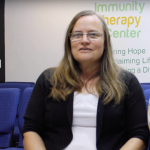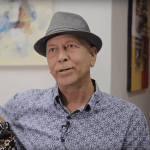Ovarian Cancer
Medically Reviewed by: Dr. Bautista
Our Editorial Policy
Updated on: November 21, 2019
About Ovarian Cancer
Ovarian cancer is a strain of cancer that affects women and primarily develops in the ovaries which are essential organs in the female reproductive system. Every woman has two ovaries that are almond-sized sacks connected to the uterus by the fallopian tube. They are incredibly important for two primary reproductive functions:
- Fertilization – They produce and release oocyte (eggs) during the menstrual cycle.
- Hormone production – They produce reproductive hormones progesterone and estrogen.
According to the Healthline, every year: “Approximately 21,000 women in the U.S. will be diagnosed with ovarian cancer. In addition, roughly 14,000 women in the U.S. will die as ovarian cancer patients in the next year”. An ovarian cancer cell is most commonly found in white women over the age of 40, with half of all cases occurring in women over the age of 63. A woman’s risk of dying as an ovarian cancer patient is about 1 in 108. Typical strains of ovarian cancer include:
- Epithelial tumors – Account for 90% of all ovarian cancers. The tumor cell occurs in the thin layer of tissue on the outside of the ovaries.
- Stromal tumors – Account for 7% of all ovarian cancers. The tumor cell begins in the ovarian tissue that has hormone-producing cells. For that reason, this strain is far more diagnosable in the early stages.
- Germ cell tumors – A rare type of ovarian cancer that occurs in the egg-producing cells of younger women.
- Peritoneal cancer – A rare form of cancer that acts and looks like ovarian cancer since the ovaries and peritoneum are made of epithelial cells. As a result, they have very similar symptoms and treatments, even though you can develop it even after your ovaries have been removed.
Causes and Risk Factors
Although we do not yet know the root causes for most ovarian cancers, we are aware of factors that make a woman more susceptible to developing epithelial tumors. Common risk factors include:
- Older age – Although it can happen at any age, it most commonly occurs in women ranging from ages of 50 to 60.
- Estrogen hormone replacement therapy – Long-term use and/or large doses of artificial hormones increase risk of developing ovarian cancer.
- Age when menstruation either began or ended – If you begin menstruation early or start menopause late, it may increase risk.
- Family history – There have been proven links of genetic inheritance of the disease.
Risk Reduction and Prevention
While some risk factors for ovarian cancer, such as age and family history, cannot be changed, there are steps individuals can take to reduce their risk and improve overall health:
- Nourishing Diet – Embrace a nutrient-rich diet that incorporates an abundance of fruits, vegetables, and whole grains. These wholesome foods provide essential vitamins and antioxidants that promote a healthy immune system and may contribute to reducing ovarian cancer risk.
- Active Lifestyle – Engage in regular physical activity to improve overall well-being can also play a role in reducing cancer risk. Incorporate exercises that you enjoy, such as walking, swimming, or yoga, to make fitness a sustainable part of your routine.
- Healthy Habits – Steer clear of tobacco and limit alcohol consumption, as these habits can contribute to health issues and compromise the body’s defense mechanisms. Avoiding these harmful substances can be a proactive measure in preventing cancer.
- Proactive Screenings – Stay vigilant about your health by scheduling regular gynecological check-ups and screenings. Early detection can significantly improve treatment outcomes if ovarian cancer is identified in its early stages.
Early Detection, Diagnosis, and Staging
Unfortunately, early-stage ovarian cancer infrequently manifests symptoms. Even an advanced-stage ovarian tumor or cancer rarely exhibits symptoms that aren’t relatively benign. As a result, it can be exceedingly difficult to detect. Such symptoms within an ovarian cancer patient may look like:
- Constipation
- Diarrhea
- Feeling full after eating small amounts
- Frequent urination
- Pelvis discomfort
- Swelling in the abdomen
- Weight loss
If you see the signs, common tests your doctor can perform include:
- Pelvic Exam – A doctor makes a digital insertion into the vagina and then presses his or her other hand against the abdomen in order to palpate the pelvic organs.
- Imaging tests – CT scans and ultrasounds can be taken of the abdomen and pelvis to better gauge the size, shape and structure of the ovaries.
- Blood tests – A blood test may be able to tell if you have cancer cells within your body. Blood is drawn to test against tumor markers and proteins commonly found on ovarian cancer cells.
- Surgery – Sometimes ovarian cancer surgery is necessary to have one of the ovaries removed to test it for cancer cell.
Stages of Ovarian Cancer
There are four stages of ovarian cancer. They are:
- Stage I – The cancer remains in the ovaries and has yet to spread to localized or distant organs.
- Stage II – The cancer is in either one or both ovaries. It has also spread to the fallopian tubes or uterus.
- Stage III – The cancer is in either one or both ovaries. It has spread beyond the pelvic region to the abdominal lining or lymph nodes.
- Stage IV – The cancer has advanced and metastasized to distant organs.
About Alternative/Holistic Treatment for Ovarian Cancer
Ovarian cancer treatment typically comprises one or a combination of ovarian cancer surgery, chemotherapy treatment, radiation therapy, and medication to reduce potential cancer recurrence. While these conventional cancer treatments can be effective, these side effects can be exhausting for patients and can weaken the immune system, making it more difficult to combat the disease. Fortunately, holistic treatment for ovarian cancer provides a natural solution to support recovery while mitigating the side effects associated with conventional cancer treatments.
If you have been diagnosed with ovarian cancer, the Immunity Therapy Center offers a full range of alternative, natural cancer care treatments to help you manage it. Our team is committed to providing completely tailored cancer care treatment plans that are structured around your specific condition and health needs. We offer one-on-one consultations with Dr. Bautista, which ensures that we get to know our cancer patients personally and build an actual relationship to provide them with the best alternative treatment for adrenal cancer. If you are interested in a customized alternative therapy treatment plan or wish to learn more about alternative therapy for ovarian cancer, contact Immunity Therapy Center today.
Sources
Baber, R. NCBI. Menopausal hormone therapy and ovarian cancer. (2015). https://www.ncbi.nlm.nih.gov/pmc/articles/PMC4604667/
Cancer.org. Ovarian Cancer. https://www.cancer.org/cancer/ovarian-cancer/causes-risks-prevention/what-causes.html
Therapies we useAt Immunity Therapy Center, our goal is to provide objective, updated, and research-based information on all health-related topics. This article is based on scientific research and/or other scientific articles. All information has been fact-checked and reviewed by Dr. Carlos Bautista, a Board Certified Medical Doctor at Immunity Therapy Center. All information published on the site must undergo an extensive review process to ensure accuracy. This article contains trusted sources with all references hyperlinked for the reader's visibility.
Customized Care For the Body And The Mind
Discuss Your Custom Alternative Treatment Plan With Our Team Today
Hear from Our Patients
See why the Immunity Therapy Center is a trusted name for medical tourism and cancer treatment centers in Mexico.




